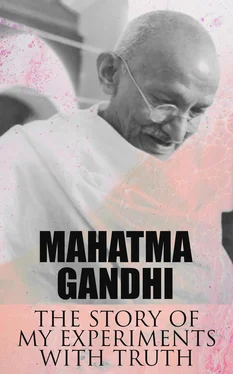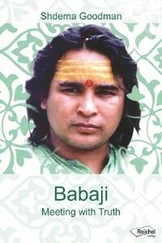Mahatma Gandhi - The Story of My Experiments with Truth
Здесь есть возможность читать онлайн «Mahatma Gandhi - The Story of My Experiments with Truth» — ознакомительный отрывок электронной книги совершенно бесплатно, а после прочтения отрывка купить полную версию. В некоторых случаях можно слушать аудио, скачать через торрент в формате fb2 и присутствует краткое содержание. Жанр: unrecognised, на английском языке. Описание произведения, (предисловие) а так же отзывы посетителей доступны на портале библиотеки ЛибКат.
- Название:The Story of My Experiments with Truth
- Автор:
- Жанр:
- Год:неизвестен
- ISBN:нет данных
- Рейтинг книги:5 / 5. Голосов: 1
-
Избранное:Добавить в избранное
- Отзывы:
-
Ваша оценка:
- 100
- 1
- 2
- 3
- 4
- 5
The Story of My Experiments with Truth: краткое содержание, описание и аннотация
Предлагаем к чтению аннотацию, описание, краткое содержание или предисловие (зависит от того, что написал сам автор книги «The Story of My Experiments with Truth»). Если вы не нашли необходимую информацию о книге — напишите в комментариях, мы постараемся отыскать её.
The Story of My Experiments with Truth — читать онлайн ознакомительный отрывок
Ниже представлен текст книги, разбитый по страницам. Система сохранения места последней прочитанной страницы, позволяет с удобством читать онлайн бесплатно книгу «The Story of My Experiments with Truth», без необходимости каждый раз заново искать на чём Вы остановились. Поставьте закладку, и сможете в любой момент перейти на страницу, на которой закончили чтение.
Интервал:
Закладка:
‘How can I do that?’ said he. ‘But he is a good man. You ask for an appointment telling him how you are connected. He will certainly give you one and may even help you.’
I cannot say why my uncle did not give me a note of recommendation. I have a faint idea that he hesitated to co-operate directly in my going to England, which was in his opinion an irreligious act.
I wrote to Mr. Lely, who asked me to see him at his residence. He saw me as he was ascending the staircase, and saying curtly, ‘Pass your B. A. first and then see me. No help can be given you now’, he hurried upstairs. I had made elaborate preparations to meet him. I had carefully learnt up a few sentences and had bowed low and saluted him with both hands. But all to no purpose!
I thought of my wife’s ornaments. I thought of my elder brother, in whom I had the utmost faith. He was generous to a fault, and he loved me as his son.
I returned to Rajkot from Porbandar and reported all that had happened. I consulted Joshiji, who of course advised even incurring a debt if necessary. I suggested the disposal of my wife’s ornaments, which could fetch about two to three thousand rupees. My brother promised to find the money somehow.
My mother, however, was still unwilling. She had begun making minute inquiries. Someone had told her that young men got lost in England. Someone else had said that they took to meat; and yet another that they could not live there without liquor. ‘How about all this?’ she asked me. I said: ‘Will you not trust me? I shall not lie to you. I swear that I shall not touch any of those things. If there were such danger, would Joshiji let me go?’
‘I can trust you,’ she said. ‘But how can I trust you in a distant land? I am dazed and know not what to do. I will ask Becharji Swami.’
Becharji Swami was originally a Modh Bania, but had now become a Jain monk. He too was a family adviser like Joshiji. He came to my help, and said: ‘I shall get the boy solemnly to take the three vows and then he can be allowed to go.’ He administered the oath and I vowed not to touch wine, woman and meat. This done, my mother gave her permission.
The high school had a send-off in my honour. It was an uncommon thing for a young man of Rajkot to go to England. I had written out a few words of thanks. But I could scarcely stammer them out. I remember how my head reeled and how my whole frame shook as I stood up to read them.
With the blessings of my elders, I started for Bombay. This was my first journey from Rajkot to Bombay. My brother accompanied me. But there is many a slip, ’twixt the cup and the lip. There were difficulties to be faced in Bombay.
XII OUTCASTE
Table of Contents
With my mother’s permission and blessings, I set off exultantly for Bombay, leaving my wife with a baby of a few months. But on arrival there friends told my brother that the Indian Ocean was rough in June and July, and as this was my first voyage, I should not be allowed to sail until November. Someone also reported that a steamer had just been sunk in a gale. This made my brother uneasy, and he refused to take the risk of allowing me to sail immediately. Leaving me with a friend in Bombay, he returned to Rajkot to resume his duty. He put the money for my travelling expenses in the keeping of a brother-in-law, and left word with some friends to give me whatever help I might need.
Time hung heavily on my hands in Bombay. I dreamt continually of going to England.
Meanwhile my caste-people were agitated over my going abroad. No Modh Bania had been to England up to now, and if I dared to do so, I ought to be brought to book! A general meeting of the caste was called and I was summoned to appear before it. I went. How I suddenly managed to muster up courage I do not know. Nothing daunted, and without the slightest hesitation, I came before the meeting. The Sheth—the headman of the community—who was distantly related to me and had been on very good terms with my father, thus accosted me:
‘In the opinion of the caste, your proposal to go to England is not proper. Our religion forbids voyages abroad. We have also heard that it is not possible to live there without compromising our religion. One is obliged to eat and drink with Europeans!’
To which I replied: ‘I do not think it is at all against our religion to go to England. I intend going there for further studies. And I have already solemnly promised to my mother to abstain from three things you fear most. I am sure the vow will keep me safe.’
‘But we tell you,’ rejoined the Sheth, ‘that it is not possible to keep our religion there. You know my relations with your father and you ought to listen to my advice.’
‘I know those relations,’ said I. ‘And you are as an elder to me. But I am helpless in this matter. I cannot alter my resolve to go to England. My father’s friend and adviser, who is a learned Brahman, sees no objection to my going to England, and my mother and brother have also given me their permission.’
‘But will you disregard the orders of the caste?’
‘I am really helpless. I think the caste should not interfere in the matter.’
This incensed the Sheth. He swore at me. I sat unmoved. So the Sheth pronounced his order: ‘This boy shall be treated as an outcaste from today. Whoever helps him or goes to see him off at the dock shall be punishable with a fine of one rupee four annas.’
The order had no effect on me, and I took my leave of the Sheth. But I wondered how my brother would take it. Fortunately he remained firm and wrote to assure me I had his permission to go, the Sheth’s order notwithstanding.
The incident, however, made me more anxious than ever to sail. What would happen if they succeeded in bringing pressure to bear on my brother? Supposing something unforeseen happened? As I was thus worrying over my predicament, I heard that a Junagadh vakil was going to England, for being called to the bar, by a boat sailing on the 4th of September. I met the friends to whose care my brother had commended me. They also agreed that I should not let go the opportunity of going in such company. There was no time to be lost. I wired to my brother for permission, which he granted. I asked my brother-in-law to give me the money. But he referred to the order of the Sheth and said that he could not afford to lose caste. I then sought a friend of the family and requested him to accommodate me to the extent of my passage and sundries, and to recover the loan from my brother. The friend was not only good enough to accede to my request, but he cheered me up as well. I was so thankful. With part of the money I at once purchased the passage. Then I had to equip myself for the voyage. There was another friend who had experience in the matter. He got clothes and other things ready. Some of the clothes I liked and some I did not like at all. The necktie, which I delighted in wearing later, I then abhorred. The short jacket I looked upon as immodest. But this dislike was nothing before the desire to go to England, which was uppermost in me. Of provisions also I had enough and to spare for the voyage. A berth was reserved for me by my friends in the same cabin as that of Sjt. Tryambakrai Mazmudar, the Junagadh vakil. They also commended me to him. He was an experienced man of mature age and knew the world. I was yet a stripling of eighteen without any experience of the world. Sjt. Mazmudar told my friends not to worry about me.
I sailed at last from Bombay on the 4th of September.
XIII IN LONDON AT LAST
Table of Contents
I did not feel at all sea-sick. But as the days passed, I became fidgety. I felt shy even in speaking to the steward. I was quite unaccustomed to talking English, and except for Sjt. Mazmudar all the other passengers in the second saloon were English. I could not speak to them. For I could rarely follow their remarks when they came up to speak to me, and even when I understood I could not reply. I had to frame every sentence in my mind, before I could bring it out. I was innocent of the use of knives and forks and had not the boldness to inquire what dishes on the menu were free of meat. I therefore never took meals at table but always had them in my cabin, and they consisted principally of sweets and fruits which I had brought with me. Sjt. Mazmudar had no difficulty, and he mixed with everybody. He would move about freely on deck, while I hid myself in the cabin the whole day, only venturing up on deck when there were but a few people. Sjt. Mazmudar kept pleading with me to associate with the passengers and to talk with them freely. He told me that lawyers should have a long tongue, and related to me his legal experiences. He advised me to take every possible opportunity of talking English, and not to mind making mistakes which were obviously unavoidable with a foreign tongue. But nothing could make me conquer my shyness.
Читать дальшеИнтервал:
Закладка:
Похожие книги на «The Story of My Experiments with Truth»
Представляем Вашему вниманию похожие книги на «The Story of My Experiments with Truth» списком для выбора. Мы отобрали схожую по названию и смыслу литературу в надежде предоставить читателям больше вариантов отыскать новые, интересные, ещё непрочитанные произведения.
Обсуждение, отзывы о книге «The Story of My Experiments with Truth» и просто собственные мнения читателей. Оставьте ваши комментарии, напишите, что Вы думаете о произведении, его смысле или главных героях. Укажите что конкретно понравилось, а что нет, и почему Вы так считаете.












